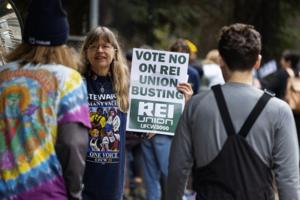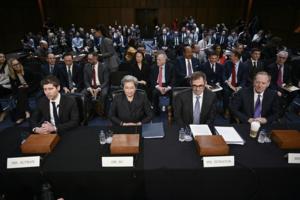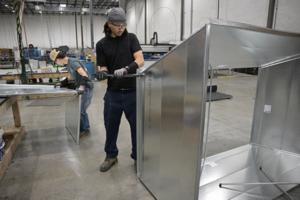Business
/ArcaMax

Hollywood's chaotic week of Trump, tariffs and tax break talk ends with no clear direction
It's been a chaotic week in Hollywood.
Less than a week ago, President Trump called for 100% tariffs on movies made outside the U.S., a move meant to bring productions home that most people in the industry believe would have devastating consequences for the entertainment business.
Then industry trade publication Deadline published the "Make ...Read more

REI members block leadership picks to guide struggling co-op's future
SEATTLE — Three candidates for REI's board of directors were rejected by voting members, a win for a union that launched a campaign against the picks two months ago.
Two of the candidates were up for reelection, with their terms expiring this year. The other open spot was a point of contention for the REI union, which represents workers at 11...Read more

Theranos felon Elizabeth Holmes loses again in court, options for early freedom narrow
A federal appeals court shot down Theranos founder Elizabeth Holmes’ latest bid to overturn her felony fraud conviction and prison sentence, narrowing her options for early freedom to a Hail Mary appeal to the U.S. Supreme Court or a presidential pardon.
The Ninth Circuit Court of Appeals, which in a three-judge decision already denied an ...Read more

Auto review: 2025 Volvo XC60 is upscale luxury heaven
Like a kid in a candy shop, I just got to test-drive the 2025 Volvo XC60 Ultra, and in my opinion this mid-size luxury SUV deserves all the accolades.
In Grasso’s Garage, it’s our highest recommended mid-size luxury SUV, and for good reason. Its size delivers plenty of room for all passengers, and all-wheel drive means it's a great choice ...Read more

Trillions in sales for S&P 500 companies at stake as US-China talks begin
U.S. equity investors will be watching closely as trade talks kick off between the Trump administration and China, with trillions of dollars hanging in the balance for American companies.
The average member of the S&P 500 made 6.1% of its revenue from selling goods in China or to Chinese companies in 2024, according to an analysis from ...Read more

Despite political promises, Californians are stressed about their finances
After voters in November sent a clear message that the rising cost of living remained a top concern, California lawmakers came to the state Capitol vowing to take decisive action.
"Our task this session is urgent and clear," Assembly Speaker Robert Rivas (D-Hollister) told lawmakers at the start of the 2024-2025 legislative session in early ...Read more

Auto review: Toyota Corolla FX is X-tra fun, until you put your boot into it
ROMULUS, Michigan — The FX is back. And so is Toyota attitude.
The Toyota Corolla FX is low, dark and mean. I circled my Midnight Black Metallic tester like Hiccup assessing his Night Fury dragon. Chocolate mirror caps, wheels with machined accents crouched on shortened springs with a chocolate spoiler out back that would make a Corvette ...Read more

Auto review: The 2025 Chevrolet Traverse is a fine family hauler – sort of
If you’ve flown on an airplane recently, you may have noticed that seats are smaller than ever, as airline executives’ bottom lines are more important than your bottom’s comfort, despite Americans growing larger than ever.
Carmakers understand, which is why vehicles like the Chevrolet Traverse exist. There are three rows that fit ...Read more

Sphere hints at higher ticket prices for future Las Vegas events
Sphere Entertainment Co. continues to lose money, but executives Thursday outlined how it plans to achieve profitability in its first-quarter earnings call.
Executive Chairman and CEO James Dolan said a combination of initiatives is underway that he hopes would reverse current trends.
Without naming acts, Dolan said the pipeline of ...Read more

Microsoft's Brad Smith, other tech execs give Congress AI wish list
Tech leaders representing four major players in artificial intelligence appeared before Congress on Thursday, urging looser regulation and heavier investment in energy to support the technology's growth.
Members of the Senate Committee on Commerce, Science and Transportation probed Microsoft President Brad Smith, OpenAI CEO Sam Altman and ...Read more

Warner Bros. Discovery breakup speculation ramps up after weak earnings report
LOS ANGELES — Warner Bros. Discovery posted disappointing first-quarter results despite growth in streaming.
But the stock rose Thursday on renewed speculation that the company will spin off its slipping cable channels.
Late last year, David Zaslav-led entertainment Warner Bros. Discovery divided its business into two divisions to separate ...Read more
Rocket posts net loss in first quarter
Rocket Companies posted a first-quarter net loss of $212 million on net revenue of $1 billion, down from first-quarter net income of $291 million it recorded a year ago, the parent company of mortgage lending giant Rocket Mortgage reported Thursday.
Rocket Companies' net revenue of $1.0 billion during the first quarter is a slight decrease from...Read more

Trump cuts British auto tariffs to 10%, hints at future deals
WASHINGTON — The United States has reduced tariffs on United Kingdom-made vehicles from 27.5% to 10%, providing import tax relief for a small but notable portion of the domestic auto market.
The reduction applies to the first 100,000 vehicles the United Kingdom sends stateside, Commerce Secretary Howard Lutnick said Thursday morning in the ...Read more

Trump cuts British auto tariffs to 10%, hints at future deals
WASHINGTON — The United States has reduced tariffs on United Kingdom-made vehicles from 27.5% to 10%, providing import tax relief for a small but notable portion of the domestic auto market.
The reduction applies to the first 100,000 vehicles the United Kingdom sends stateside, Commerce Secretary Howard Lutnick said Thursday morning in the ...Read more

Despite Trump's criticism, Powell keeps Congress on his side
Under relentless attack from President Donald Trump, Jerome Powell needs all the allies he can get — and he has plenty in Congress, including among Republicans who show little appetite for ditching the Federal Reserve chief.
Collectively, GOP lawmakers have endorsed almost every other economic idea that second-term Trump has put forward. But ...Read more
Real estate Q&A: Are the renters next door breaking the rules to control their dogs?
Q: A family recently rented the house next to ours in our community association. They have several dogs and attached a temporary fence to our permitted wooden fence to form a corral for their dogs to stay outside all day and bark. Are they allowed to attach to our fence without permission? Is there anything we can do about the noise? —Caroline...Read more

Commentary: The calculated dismantling of minority business opportunity in America
A recent executive order to dismantle the Minority Business Development Agency (MBDA) is another policy change in America's long history of systematically suppressing minority economic advancement. This decision, which threatens to unravel decades of progress in fostering minority entrepreneurship, demands immediate attention and action.
Since ...Read more

'Made in USA' gives edge to Denver manufacturer, but doesn't spare it effects of tariffs
Bringing manufacturing back to the U.S. is one of the prime reasons behind the Trump administration’s tariffs, but Hercules Industries is ahead of the game. The Denver company’s heating, ventilation and air conditioning products have been made in America since its start in 1962.
Roughly 95% of the steel Hercules uses is made in America. And...Read more

Zillow forecasts San Diego home values to drop for the first time in years
Zillow has broken from the pack to say San Diego County home values could decrease over the next year.
Home values in San Diego County will drop 1.1% by March 2026, Zillow said in its latest Home Value Index. While the decrease is small, it’s notable because no other major forecasters have said home prices, or values, would drop, and it’s ...Read more

Is Las Vegas becoming Los Angeles 2.0?
By 2021, as the COVID-19 pandemic swept across the globe, Las Vegas-based luxury real estate broker Ivan Sher started noticing a distinct migration pattern from California’s affluent neighborhoods to Las Vegas.
“What I think pushed people over the edge” in California was government mandates that impacted them and their children in school,...Read more
Popular Stories
- Theranos felon Elizabeth Holmes loses again in court, options for early freedom narrow
- Auto review: 2025 Volvo XC60 is upscale luxury heaven
- REI members block leadership picks to guide struggling co-op's future
- Hollywood's chaotic week of Trump, tariffs and tax break talk ends with no clear direction
- Under Armour seeks tariff exemption for footwear










